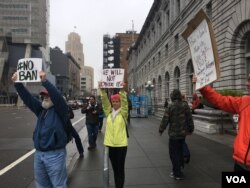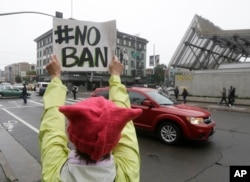A U.S. federal appeals court expects to issue a ruling sometime this week on the government's request to end a temporary pause of President Donald Trump's travel ban.
A lower federal court issued the temporary restraining order last week, saying the government could not enforce the 90-day entry ban on people from seven Muslim-majority countries or the 120-day suspension on accepting refugees.
Now the three-judge panel on the 9th Circuit Court of Appeals is deciding whether to uphold that order, strike it down, or potentially send the case back to the lower court for further consideration. No matter their ruling this week, the case is likely to end up at the Supreme Court.
The judges heard arguments by telephone Tuesday from an attorney representing the states of Washington and Minnesota, which say the travel ban is unconstitutional and should be invalidated, and from a Department of Justice lawyer who said the president has the authority to issue such an executive order and protect national security.
During his argument, DOJ attorney August Flentje presented the judges with a potential option of deciding to keep the ban in place for people who are not yet in the United States, but exempt those who have already arrived.
Rory Little, a law professor at UC Hastings, said he does not think the judges were persuaded by the government's overall argument and are unlikely to lift the ban on enforcing Trump's order.
"On balance it doesn't sound like the court is going to grant the motion to vacate the stay. They might try to narrow that or they might deny the motion and send it back to the trial court to narrow it, which strikes me as probably the more strategic decision. But I think either way, the Trump administration is going to take it up to the Supreme Court."
Asked about the prospect of the case going to the Supreme Court, Trump himself said Tuesday, "Hopefully it doesn't have to."
"Oh we're gonna take it through the system," Trump said. It's very important. It's very important for the country, regardless of me or whoever succeeds at a later date."
If the ban is restored, opponents say the decision might lead to renewed confusion and chaos at many of the nation's airports, just as it did when the executive order was signed by President Trump on January 27. Hundreds of people were later detained by customs officers at airports, and some of them were deported. That action sparked nationwide protests and prompted legal action on many fronts.
If the 9th Circuit does rule on the case, rather than ordering it back to the lower court, that decision will have big implications for possible action by the Supreme Court.
The nation's highest court has been shorthanded since the death last year of Justice Antonin Scalia, and it is now evenly divided between four liberal-leaning justices and four conservative-leaning ones. It would take the votes of five Supreme Court justices to overturn the appellate court's ruling, meaning a 4-4 tie would let stand whatever the 9th Circuit decides.
The Supreme Court could also decline to hear the case.
For now, enforcement of the order is entirely suspended, and immigration advocates have been encouraging people who have obtained U.S. visas to board airplanes as soon as they can. Each day since the suspension, would-be immigrants have been doing just that.







